| |
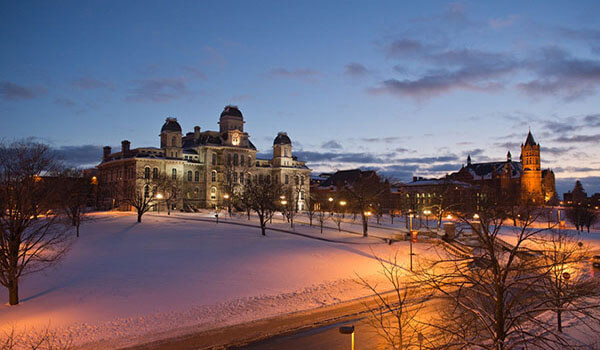 |
| | | SU English Department Newsletter | | | | | |
| A Note from the Chair 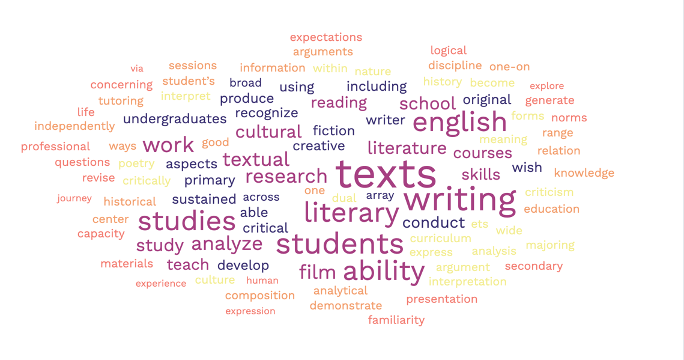
The most exciting piece of Department of English news is something that one really must experience, rather than read about. It is the ability to sit in a classroom and look around the room at mostly unmasked faces, it is the chance to sit in a circle or break into small groups and to see each other’s faces as we grapple with difficult concepts, bask in the rich pleasure of a beautifully written paragraph, appreciate a student’s brilliant presentation, or laugh at another student’s sly joke at the professor’s expense. It is English and Creative Writing students and faculty joining with SU librarians and students and faculty from the LGBTQ Studies Program and the African-American Studies Department to read passages from their favorite banned books in honor of Banned Book Week and in defiance of the national movements to censor Black history and LGBTQ representations in public education and public libraries. It is the opportunity to gather together with over seventy students and faculty to celebrate the publication of twelve books by faculty during 2021. It is twenty-plus students gathering weekly to eat pizza and write alongside one another in weekly Write Out sessions hosted by the Creative Writing Program. While this term has not been a complete “return to normal,” we have enjoyed the recovery of some of the most precious aspects of embodied, collective learning. Less exciting, per se, but incredibly important for the self-definition and future of our department, is the process of strategic planning that we have embarked on. The university’s new provost, Gretchen Ritter, has initiated a university-wide strategic planning process.* The College of Arts and Sciences, which has begun its own strategic planning process in conjunction with the University’s, has charged each department with creating its own strategic plan as well. Because our department has been reconnecting after more than two years of virtual meetings, we have begun this process by working at the level of fundamentals. We conducted a departmental scan and have drafted several versions of a departmental purpose statement. Our next steps will be to work on our departmental mission and vision documents. Hopefully, I’ll be able to share these with you in our spring newsletter. In the meantime, enjoy the word cloud (above) drawn from our draft purpose statements! -Coran Klaver, Chair of English | | | | | |
| |
| Creative Writing Outside the Classroom College students are busy. Between completing classwork, managing a (hopefully) fulfilling social life, and trying (desperately) to get enough sleep, it’s hard to imagine a college student fitting much else into their schedule. You’ll understand my surprise then, when during the first day introductions in my Feminist Fictions English class, two of my classmates mentioned their current endeavors at writing novels. I was immediately impressed by these students. As someone who enjoys writing creatively and who hopes to one day write a novel, I was struck by these two women who weren’t putting it off for the future. How do they have time to work on writing projects outside of class? What benefits could it possibly give them? To answer these questions, I talked to one of the high-achieving writers herself, along with the facilitator of the campus creative writing club, Write Out, and the Editor-in-Chief of the campus literary magazine, Perception. Rachel Simpson is a second-year undergraduate student majoring in English Education. Over the summer, she decided to start her novel, which she calls a “passion project” and a way to challenge herself creatively. In the past, Simpson wrote poetry and even dabbled in songwriting. “I wanted to challenge myself to see if I could write a creative piece, and like a large creative piece at that,” she said. Although during the semester it has become admittedly harder for Simpson to sit down and work on her story, she views creative writing as an outlet for stress. “There are times when I definitely don’t have the time here, but I know that if I could write it would make me feel better and it would kind of put my mind at ease among the stress of school,” said Simpson. Kimberly Dawn Stuart, a third-year M.F.A student at Syracuse, sees other students using creative writing in a similar way. As the facilitator of Write Out, Stuart joins students once a week in answering writing prompts, playing word games, and watching literary-focused movies. She says the turn out to these meetings is generally impressive but fluctuates as the semester goes on and students get busier; attendance ranges from about 35 students to only a handful during busy weeks. Stuart sees creative writing as more than just an outlet for stress: “First of all, creative writing is an outlet, it’s a fun hobby. But then when you’re out in the world, being a creative writer gives you such control over language,” she said. She emphasized to me that writers have an advantage after graduation because of how writing affects not only one’s command of language, but also one’s outlook on the world. “Being a writer makes you observant of the world, and when you enter the world as a writer it becomes endlessly interesting. You see things differently, and you interact with things differently when you’re looking at it through a writer’s lens.” For young writers not yet out in the world, SU’s Perception magazine offers a place to see creative pieces published on campus. Unlike some of the more prominent campus news publications, Perception picks up poetry, short stories, and art pieces that Editor-in-Chief Ariel Samuel states fall into “the cracks and crevices.” Samuel also notes that, “It can give students motivation to write, knowing that ‘oh, I have to submit for Perception by this deadline.’” Further, she mentioned the importance of Perception for beginning writers to gain confidence from seeing their writing in print. While my initial feelings of amazement have not completely dissolved, I now have a better understanding of why students might prioritize extracurricular creative writing. Fitting in this writing among the barrage of essays, Blackboard posts, and exams from everyday coursework seems to allow some students to reconnect with what they love about writing, and it seems the benefit of this practice extends far beyond the classroom. Though, like me, you might not be quite ready to jump into writing a novel, practicing some form of creative writing might be an enjoyable way to escape the stress of everyday life. For more information about Write Out contact Kimberly Dawn Stuart at kdstuart@syr.edu. For more information about Perception magazine visit https://perceptionsyr.wixsite.com/perception. Novel by Rachel Simpson: TBD ~ story by Kayla Lohman | | | | | |
| |
| I Am Planning to Apply for a Creative Writing MFA Program and Maybe You Should Too As I approach the end of my senior year, I reminisce about the valuable experiences and opportunities I have had at Syracuse University (SU). In the back of my mind, I can’t help but ask myself: did the costs outweigh the benefits of attending college? Was it worth being a Creative Writing and History double major? Do I regret it? My answer is no. If I had a chance to redo my undergraduate career, I would still choose to double major in English and History. The only thing I wouldn’t do again is tack on the pre-medical track on top of my majors. English is often looked down upon as an unemployable major. It’s a persistent but incorrect stigma. English graduates actually enter and work in various fields such as education, law, journalism, publishing, talent management, marketing, or social media management. By earning an English degree, you learn how to read, interpret, and think critically. Application of these skills would allow you to learn how to construct and deconstruct an argument effectively, all of which are highly sought after skills in the job market. Even though I made the switch to Creative Writing, I value the critical English courses I took. In these, I honed my analytical and rhetorical skills to become a better writer. As a Creative Writing major, I focus more on forms and writing techniques instead of crafting an argument and utilizing pieces of text to support the argument. I value the creativity and freedom of creative writing. In particular, I love the workshop classes. Every week in the workshop, we read and give feedback on someone’s piece. This process has helped me build confidence in myself as a writer. I have also gained insight into what I can do to be a better writer and ways to explore other writing styles in hopes that I can emulate them. Since completing the Creative Writing major, I really want more time to enjoy writing before I commit myself to medical school. After talking to my English professors and some Masters of Fine Arts (MFA) students, I have decided that I want to go to graduate school for writing. When people think of higher education, they grimace in fear of the expenses. It’s no secret that the cost of higher education has risen in the past few decades. However, there are at least 50 accredited universities in the U.S. that cover the tuition of their MFA program (in the form of a fellowship) and provide a teaching stipend. You won’t live comfortably, but it’s a livable wage. Depending on the program you are accepted into, you will devote two or three years into earning your MFA. For most applications, you will need to submit a transcript, letters of recommendation, a sample of your writing, and a purpose statement. But, as always, do your research and take your time on deciding what schools seem like the best fit for you. If this sounds appealing to you, join me in applying! ~ Ivy Lin | | | | | |
| |
| COURSE HIGHLIGHT: The Art of the Fairytale with Professor Mona Awad 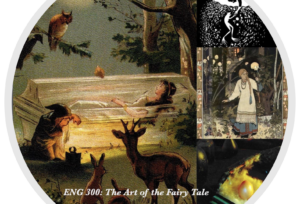
As a senior in the English Textual Studies major here at Syracuse University, I have taken my fair share of courses in the department. As any college student will tell you, some have been more enjoyable than others– all English majors know “Reading and Interpretation” as a rite of passage. On the more enjoyable side of the spectrum, I have found excitement in finding meaning in challenging, dense novels, and even more joy in sharing my findings in an elaborately crafted essay. The satisfaction I find in the repetitive action of analysis stays true across all courses I have taken, but when I decided to take Professor Awad’s The Art of the Fairytale course, I found a deeper appreciation for the time I had previously spent picking apart the writings of others. On the first day of class, Dr. Awad told us we would be writing our own fairytale stories as our final at the end of the semester. To me, this felt just like when I was hiding in the gymnasium’s corner in high school gym class and my teacher tossed me a football and told me to “sub in.” I don’t play football, and I don’t write fiction. I tried to push this daunting task out of my mind all semester. I hoped that in a matter of 11 weeks, Professor Awad could turn me into a Pulitzer-level creative writer; otherwise, I was going to feel like a fish out of water come May. We did many writing exercises and read story after story and discussed why the story was compelling to us, how the fairytale aspects kept us engaged, and most importantly what the author did to make us feel this way. Though deeply apprehensive about taking a creative writing class after three years of strictly critical analysis, I discovered that the two aren’t so different after all. As a writer, I like to focus on what is true, and I often fail to imagine fantastical stories or different lives my character could live. I thought that the critiques we write in our critical writing classes could not be more different from the stories of Fairy Tale I wrote in Dr. Awad’s class. In the end, I learned that Fairytale and fiction more broadly are based in real life, and that after I’d done enough critical analysis of these stories and experiences, I was able to create something I was proud of. In May of this year, I completed my Fairytale story for Professor Awad; a story about my best friend, a magical tale based in reality. I realized my fear of creative writing was holding me back from telling stories I had wanted to tell for a long time. I didn’t have to make up an imaginary town or tragic backstories for fake people, and my writing process didn’t differ much from all of the previous work I had done as an English major. In one semester, I had learned so much as a writer and reader because I stepped out of my comfort zone. I cannot say I will go on to write much more fiction, but I can say that delving into a new kind of writing gave me inspiration and a fairytale-like imagination to bring back to my studies. ~Mady Gosselin 
| | | | | |
| |
| The Capabilities of an English Major: a Snapshot of the Alumni Panel 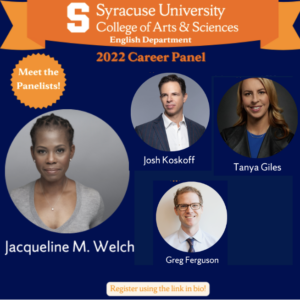 In November, the English Department welcomed four Syracuse English alumni to speak at the yearly English Department Career Panel. The event opened with Greg Ferguson, Senior Vice President and Head of Publishing at 3BlackDot, who shared how networking at Syracuse provided him with opportunities and experiences to grow and increase his passion for writing and publishing. Career wise, he leads the book intellectual property business, and he enjoys spreading literacy through stories to a diverse field of readers. In November, the English Department welcomed four Syracuse English alumni to speak at the yearly English Department Career Panel. The event opened with Greg Ferguson, Senior Vice President and Head of Publishing at 3BlackDot, who shared how networking at Syracuse provided him with opportunities and experiences to grow and increase his passion for writing and publishing. Career wise, he leads the book intellectual property business, and he enjoys spreading literacy through stories to a diverse field of readers.
Next, attendees heard from Tanya Giles, who is the Chief Programming Officer for Paramount Streaming. Working in media and entertainment, Giles enjoys how stories are told. Through her English department experience at Syracuse, she realized the value of text, and what they have to say within their specific cultural contexts. Through spending a portion of her career working with large corporations, Giles is also well versed in advertising and marketing. Now, working at Paramount, she advances the industry and expands accessibility of the media to all people. The panel advanced with Josh Koskoff, a trial attorney who emphasized how the law can work to aid all people, not just the rich and powerful. He revealed how his father shared that “There are no jobs that are called English,” meaning that a major in English expands career options and does not constrain you to one field of work. Koskoff noted that English teaches us a broad range of skills, such as analytical thinking and comprehending different relationships. He affirms that an English degree makes a well-rounded intellect, as it involves interacting with people in different situations. Being a lawyer means being a good communicator, and an English major set him up for this extremely well. The final speaker was Jacqueline Welch. Welch has worked in retail, consulting, manufacturing, media and entertainment, and financial services. Currently, she leads Human Resources for The New York Times. Welch explained how she gained the skills of applying learned information from close reading and interpreting through her English major. She also shared how these qualities are what employers look for when hiring – and she should know! She feels her decision to switch from Pre-Med to an English major made her happy and provided her with a purpose. Welch recounted the English department’s extraordinary professors, all of whom helped integrate literature and a well-informed point of view into her life as a scholar. The panel concluded with a Q&A that garnered many interesting questions from students. English major Sarah Alessandrini asked Greg Ferguson if her English and Newspaper majors complement one another, and if he incorporates his English major into his media work. Ferguson emphasized the benefit of having a foundational writing, reading, and critical thinking ability and assured her that both majors are equally valuable in his career. Tanya Giles added that her studies in Newhouse helped her make industry connections, but that her English major is what made her really good at her job. Moving forward, Professor Coran Klaver inquired about internships, asking how students should navigate securing an internship to increase their exposure to possible career paths. Giles urged students to connect with alumni. Josh Koskoff added that many alumni love to hear from students and are willing and happy to help. Jacqueline Welch added, “don’t become strict constructionists too soon about your careers. … open the aperture, take any internship.” All four panelists are a testament to how valuable an English major is. Additionally, the diverse careers represented on the panel prove the extreme flexibility of English skills. Studying English is foundational, and knowing how to present information in a logical and compelling way allows for stories to be told. Through homing in on the skills an English major offers, people can reach multiple audiences and contribute to any field. It is evident that these panelists acquired a plethora of skills through attaining their English degrees at SU, which in turn has prepared them for major success in their careers. ~Ishika Bharadwaj | | | | | |
| |
| SU London English Professors Decide the Best Bookstores in London London is an onion: it has layers. One can study here for almost four months and still only reach the tip of the iceberg of wonders London has to offer. All the attractions, Michelin-star restaurants, and multi-colored vomit puddles on the Tube can be overstimulating. Sometimes, one needs a habitat for serenity. London has many of these, and they are called bookstores. Peppered throughout the winding streets of London, each neighborhood is almost guaranteed to have a bookstore with its own unique voice and charm. I asked the English (and English-adjacent) professors of SU London their favorite bookstores to visit, and while they ranged in specializations and history, they each knew well the joy that can only be found reading in a perfect bookstore. Professor Mark Leipacher teaches ENG 320: Interpreting Shakespeare at SU London. In this course, students read a Shakespeare play, watch a live production at a theatre in London, and then discuss the significance of the live adaptation’s interpretive choices in relation to the original text. As a writer, producer, and director of theatre himself, Professor Leipacher recommended a bookstore that brings the worlds of reading and performance together: The Calder Bookshop & Theatre. This bookstore offers a wide selection of theatre-oriented reading material (plus, if the bookstore’s website is truthful, a gorgeous black kitty may be sleeping on top of some of those books), and you can also catch a show in the bookshop. If your goal while in London is to research theatre and then write and produce your own play, you’ll be glad to know that the Calder Bookshop has an attached rehearsal space. 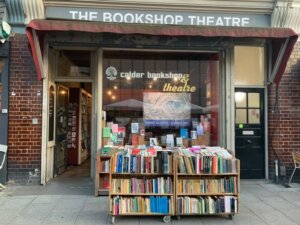
Professor Justin Hunt teaches WGS 416: Bond, Holmes, and British Masculinity, a film course for the Women and Gender Studies major that examines the portrayal of masculinity and gender performance of James Bond and Sherlock Holmes through various films and television series. Professor Hunt had two recommendations, the first being the London Review Bookshop. Located in Central London nudging shoulders with the British Museum. Professor Hunt’s attachment to this bookstore began when he was studying for his Ph.D. “The LRB is often where I met my supervisor during my Ph.D. to review chapter drafts, to attend readings, or just to catch up. Its varied collection of prose, poetry, and wild array of scholarship make it ideal for a browse, a quick nerdy gift, or a quick nibble before attending an event in central London.” 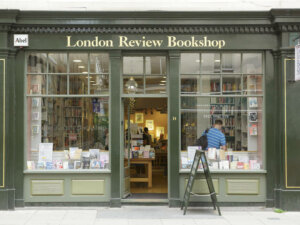
The other favorite bookshop of Professor Hunt’s is Burley Fisher, a bookstore that he believes contributes significantly to the literary culture and scholarly thought of London (one way they do this is through their podcast, which I highly recommend). Professor Hunt explains, “Burley Fisher is where I go to buy any of my friends, colleagues, or current obsession’s writing. They stock a myriad of queer titles across genres and support local artists and writers in a multitude of ways. You’re always bound to run into a friend inside Burley Fisher which makes it feel even more like a proper “local” bookshop. I tend to pop down the street to one of the local pubs to read whatever I’ve purchased with a pint.” 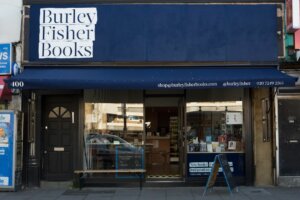
For those who cherish nothing more than to cozy up with a book and see where the day takes you, either of these options can fulfill that dream in a heartbeat. Professor Bev Zalcock teaches ENG 430: Global Cities, World Cinema. The class screens films from England to Japan to Chile and everywhere in between, and analyzes how those films represent the cities and countries that they are based in. With a majority of the class consisting of unpacking history, it shouldn’t surprise one to learn that Professor Zalcock’s favorite bookshop, The Freedom Bookshop, has a long-celebrated history of political engagement – and no one can explain it better than Professor Zalcock herself: “My favourite bookshop is The Freedom Bookshop in the East End of London. Situated in a dingy passage called Angel Alley, it conjures up so much of London’s radical past and present. It is a site of historical resistance and the place where as a student I developed my own political ideas…The bookshop began in the 1840s as a print shop. The East End was a place where European immigrants settled, and it became a magnet for various political groups to hold their meetings and produce pamphlets. An assortment of Left-wing intellectuals, charity workers, and ladies of the night inhabited the area, and in 1880 The Salvation Army set up a refuge for abused women living under the shadow of the murderous Jack the Ripper. After suffering substantial bomb damage during WW2, the shop was rented at a very cheap rate to an anarchist group, who established it as The Freedom Bookshop, selling a range of radical literature as well as printing a newsletter. The tradition of using the shop as a meeting place for activists continues to this day, and despite attacks from fascist groups over the years, the shop has survived as a beacon of resistance.” 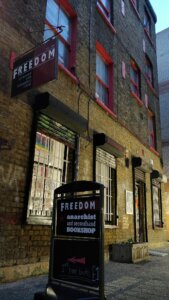
The Freedom Bookstore is perfect for the moments when one may want to simultaneously soak in London’s rich history while relishing in a splendid novel. London is a multicultural, forever unwinding with new stories, cultures, and landmarks at every step. Bookstores work best as checkpoints when roaming through London. They are the perfect place to gather thoughts, soak in the surroundings, and take a most necessary breather. If you’re considering studying abroad in London, I have two pieces of advice for you: 1. Do it. 2. Don’t forget the bookstores. The best moments of your London experience may transpire there. ~ Sam Baylow | | | | | |
| |
| |
| |



